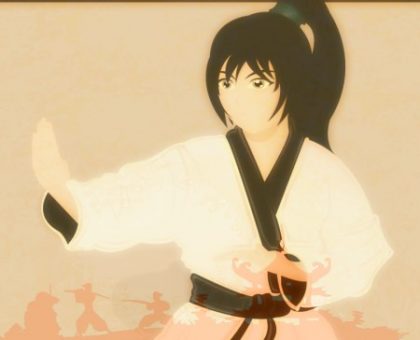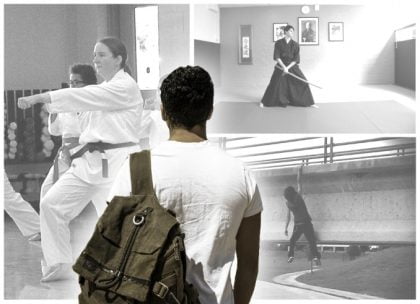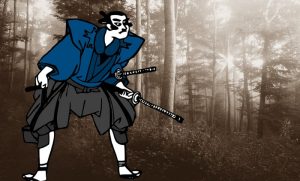After a half-decade break from Aikido training, I returned to the dojo in July feeling more self-conscious than excited. Owing to the large gap in time, my technique execution had become clumsy and ineffective, making me feel thoroughly incompetent to be even wearing my brown belt. Trainees who were once my juniors now outranked me in skill and grade.
What had upset me, however, was the presence of learning and performance anxiety during training. Contrary to my belief, past training efforts had not gotten rid of the anxiety permanently- my old habits motivated by the fears of making mistakes, being scolded and looking stupid have returned.
Anxiety in Sports and Martial Arts Impedes Progress
Anxiety in sports is fairly common (especially among beginners) and stems from the fear of performing badly in front of people. It is a form of performance and social anxiety that tend to diminish one’s abilities – the fear of appearing incompetent in a sports and martial arts environment.
So, combine anxiety with attempting to learn and perfect abilities that require motor coordination, and I become a nervous wreck whose ability to absorb and recall information is severely hampered. Where keen observation and conscientious correction of one’s technique are ideal to good progress in martial arts and sports, anxiety is a distraction to this process of self correction.
The first month of my return saw learning and performance anxiety that was so distracting that I failed to notice the footwork, movements and nuances that determined its effectiveness as the Aikido technique was being demonstrated. With the stubborn desire to avoid embarrassing mistakes, I obsessed over predicting the errors I could possibly make and excessively focused on that one specific step of a technique during Sensei’s demonstration. Naturally, when it was time to partner up and train, I had no idea how to begin executing the technique that had been demonstrated moments ago.
Aware that anxiety has been sabotaging training progress in hindering my ability to process and learn, the following explores the past and the underlying root of the problem. Clearly, I must have missed something the last time, since there was no lasting effect from past training on alleviating my sports-based anxiety. I need to move past this anxiety-mode of learning sports and martial arts abilities.
Inferiority Complex: No sporting ability and slow in learning
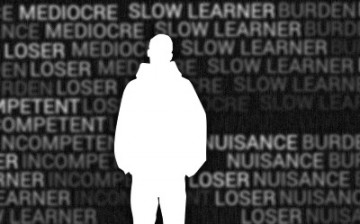
“Terrible motor-coordination abilities, incompetent loser in sports and martial arts, horribly slow in learning sports” – these words summed up the underlying belief I had of myself that was held since childhood.
Perhaps I wasn’t at all slow at learning and maybe my sporting ability wasn’t beyond hopeless. But, over time, lies can become the truth when you believe them. The destructive belief subconsciously influenced my attitude towards and habits within sports, and so, set off a self-fulfilling prophecy that fulled my anxiety and tainted my experiences in physical activities over time.
Bad childhood training experience gave birth to inferiority complex
It began at the age of seven when I had my first encounter with learning kata in my weekly Taekwondo classes. As a quiet child with little confidence, learning a series of choreographed patterns was hard. I was bad at memorising the many steps and was constantly yelled at in my face, which did nothing but made me panic and lose the little confidence I had. Soon enough, the other kids avoided me. My progress became much slower and I dreaded going for classes in which I would feel humiliated, incompetent and isolated.
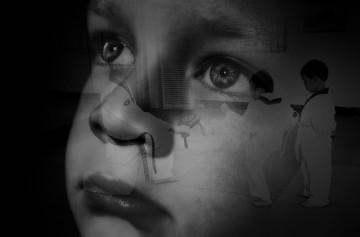
Eventually, because the frustrated yelling had always accompanied my learning process in Taekwondo, anxiety became a norm when confronted with learning physical skills that required motor-coordination. I concluded at that age that I was an incompetent burden, who had no skill in sports and martial arts. In doing so, I had entrenched the inferiority complex over my slow learning and lack of natural ability.
With that, I sought always to avoid team sports and physical activities when possible. As a result, I forwent the opportunity to build confidence in my learning ability, develop the skill to learn how to learn sports-based abilities, and refine basic sporting skills taught during P.E. (Physical Education). The destructive belief that I had formed early on in life ensured that I faced sports and martial arts with anxiety and a defeated attitude, thereby proving to myself time after time that I was slow in learning, unskilled and a burden to whatever team that I was on.
Writer’s Note: Even though the Taekwondo instructor’s yelling may have been well-intentioned and worked well for the rowdier children, it wasn’t suitable for me due to my quiet and sensitive personality as a child. As such, the dojang where I trained in was not necessarily bad. nor is it reflective of how all Taekwondo training halls are operated.
Failing to get rid of learning and performance anxiety for good
After years of avoiding physical activity, my passion in martial arts and desire to develop my confidence prodded me to give martial arts another go during my adolescence. Due to my lack of confidence in memorising long series of choreographed patterns, I chose Aikido.
Temporary alleviation of anxiety in Aikido
My learning and performance anxiety in martial arts lessened as a subconscious side-effect of training regularly. Familiarity and trust with the Aikido dojo environment had broken the connection to my early bad experience in martial arts and desensitised my anxiety triggers, enabling me to learn with little distraction from anxiety.
But… some issues relating to performance and learning anxiety were never directly addressed. These are some problems back then that contributed to the return of anxiety.
1. Relying on familiarity to a specific training environment
Training regularly in the dojo enabled me to be familiar with my training environment and helped lessen the anxiety. However, because I was only familiar with the dojo and did not expose myself to other sporting situations, the performance anxiety persisted everywhere else. This was especially evident when I began learning marching and weapon drills upon being enlisted to the military.
As such, my method of alleviating anxiety was incomplete and highly reliant on being comfortable in a specific training environment. The return of anxiety was a result of the half-decade break from training that erased my familiarity to my dojo.
2. Failing to deal with anxiety and learning in a conscious process
In addition to being incomplete, the lessening of anxiety through regular training was only a subconscious process that just happened. There was neither a conscious decision nor effort to first manage anxiety and then work on improving the way I learnt in sports and martial arts.
Looking back, my objective had been to build self-confidence in taking up Aikido. Yet, my lacking self-awareness prevented me from seeing the sports-based anxiety as an impediment to confidence.
Hence, I had never really made any effort to seek the root cause of my anxiety and discover solutions specific to anxiety and learning better. It was pure stupid reliance of faith that my haphazard efforts at building confidence would work and I would become less anxious as a subconscious side-effect. Clearly not true at all, since I had no experience from back then to kill off the present anxiety and learning issue.
3. Believing that being mediocre in martial arts and sports was an unchangeable fate
On hindsight, another reason why I made no conscious decision to tackle the issues with anxiety and learning was because of my belief that there was nothing I could do to improve my natural ability in sports and become a better learner.
Subconsciously, I was still convinced that being a slow learner with no natural sporting ability had doomed me into an unchangeable destiny of being an inferior martial artist. Performance anxiety would always be the norm for me. Genetics was was set in stone and I could only contend to remaining at status quo (or just give up). I had been stubbornly convicted to the view that these weaknesses would always make me vastly inferior to the average sportsman and martial artist.
4. Misunderstanding the root cause of my learning and performance anxiety
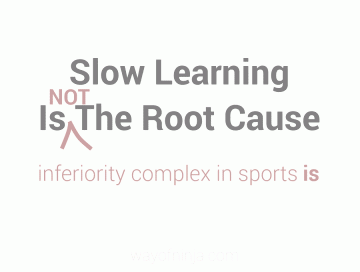
Obviously, the anxiety issue was never about me being a slow learner or a mediocre sportsman. No. But that was what I had believed was the root cause of my anxiety when writing this post earlier on.
I had failed to realise that the performance and learning anxiety arose from an inferiority complex from being slow in learning and having no natural ability. By accepting the limitations set by my inferiority complex in sports, I was only running in circles in this self-fulfilling prophecy loop. This was the missing key to resolving the complicated issue with anxiety and learning how to learn with finality.
Moving towards resolution
This reflection of the past and present was a journey of self-discovery necessitated by my desire to be much better in martial arts and other physical activities. The ultimate goal of improving my underdeveloped learning ability and sporting ability can only be done after weeding out anxiety and the underlying inferiority complex.
Fortunately, in the four months since I resumed Aikido training, I have been consciously working on the aforementioned issues with great progress. Despite this still being a work-in-progress, here’s what I did to alleviate my training anxiety in part two. I sincerely hope that this series would help fellow martial artists and sportmen alike, who suffer from anxiety and/or an inferiority complex for whatever reason.
What fuels your anxiety and what have you done about it? And if you have resolved the mentioned issues, what was your journey like?
Whether you are a beginner, a slow-learner or are suffering from some form of inferiority complex in martial and sports that causes anxiety, please share your thoughts in the comments section below. If you have found my insights helpful, please share this post.
Note: Dealing with Anxiety in Martial Arts and Sports as a Slow Learner (Part 2)

